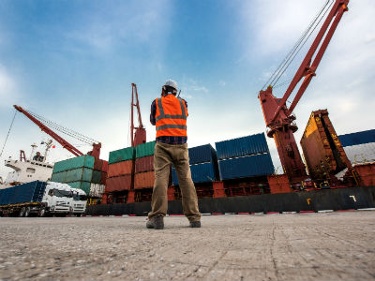
One of the more common questions we hear from beginning exporters is “What are these fees in my freight forwarder invoice?”
We spoke to Tom Hullinger, regional vice president at Global Distribution and Logistics, a freight forwarder based out of Chicago, to find out what charges—common and non-standard—you can expect to see when you get your freight forwarder pricing list.
5 Common Charges on Your Freight Forwarder Invoice
1. Air Freight or Ocean Freight Forwarder Pricing
The most obvious of freight forwarder fees, the air freight or ocean freight forwarder price depends on several factors, including the physical size of your export (the dimensions), the origin of the shipment, and the destination. A lot of forwarders lump sub-fees into this line item to create a flat fee based on TSA regulations; those sub-fees may include:
Airline security charge
Fuel surcharge
Cargo screening/X-ray fee
2. Pickup Charge
This is the cost associated with collecting a shipment from a shipper’s warehouse.
3. Freight Forwarder Handling Fee
This fee on the freight forwarder price list is associated with processing paperwork, copying documents, and preparing the air waybill/ocean bill of lading (or other bill of lading). It helps freight forwarders cover the cost of processing and handling shipments, and usually ranges anywhere from $35 to $75.
4. AES Fee
Every export transaction is required to have an accompanying AES filing. Freight forwarders charge a fee for making an export entry with AESDirect for the shipper’s export. This fee is generally $30 to $35.
You can—and should—avoid this fee by doing the filing yourself! Freight forwarders should be there to assist you; not do your filing for you!
As an importer you are required by law to use reasonable care when classifying and declaring your imports coming into the United States. As an exporter, you are required by law to perform your due diligence when exporting your products, which includes ensuring that the Electronic Export Information (EEI) is correctly filed through the Automated Export System (AES).
5. TSA Security Charge
Freight forwarders implemented the Transporation Security Administration (TSA) security charge shortly after the terrorist attacks of September 11, when the TSA set forth new regulation requirements. Freight forwarders who handle air freight must adhere to many regulations from the TSA—including employee training, records, maintenance, etc.—as a way to offset those costs, they began charging a fee.
The TSA security charge is separate from the cargo screening fee listed above. The airline must X-ray or physically screen all cargo that goes on the aircraft, and they apply a fee associated with the physical screening.
Non-standard Charges You May See on Shipments
In addition to the five common charges above, these lesser-known charges also contribute to the freight forwarder cost structure:
1. Fees for Department of State-Licensed Shipments
The U.S. government requires a license for all types of controlled exports, which mainly consist of military cargo. In these cases, freight forwarders must present a license to customs, and charge you an export customs clearance fee.
Typically, these exports are also insured. Manufacturers tend to assume cargo is insured if it’s lost or damaged, but this is often not the case. Insure your exports to make sure you are protected against loss.
Often, courier fees are charged to the exporter when couriering the license or documentation back to the exporter/shipper.
2. Certificate of Origin
Depending on the destination country of your goods, you may need a certificate of origin to verify the manufacturer of the goods. In this case, freight forwarders prepare the certificate and have it stamped by a chamber of commerce official to attest to manufacturing location. There are fees involved for processing and certifying the document.
But before you have a freight forwarder complete your certificate of origin, check out this article: 6 Reasons You Shouldn't Rely on Your Freight Forwarder to Complete a NAFTA Certificate of Origin.
3. Hazardous Material
The freight forwarder cost structure includes a fee for shipping and handling hazardous materials and explosives. Military goods often have detonators, magazines with explosives, etc. It’s imperative these goods are handled correctly.
Forwarders may also add a Dangerous Goods surcharge and a Dangerous Goods declaration. This document informs the carrier of a hazardous commodity that requires special handling when loading or stowing in aircraft or an ocean container. There are different procedures for receiving and handling hazardous materials.
4. Legalization
Primarily in Middle Eastern countries, legalization is the process forwarders will go through in order to send documents to a consulate or embassy. The fees associated with this process are then itemized on a freight forwarders pricing list, including processing, presentation to the embassy, and courier fees.
( Melissa )07 Dec,2017BRIEF
INTRODUCTION
Cnbearing
is the No.1 bearing inquiry system and information service in
China, dedicated to helping all bearing users and sellers throughout
the world.
Cnbearing is supported by China National Bearing Industry Association,
whose operation online is charged by China Bearing Unisun Tech.
Co., Ltd.
China Bearing Unisun Tech. Co., Ltd owns all the rights. Since
2000, over 3,000 companies have been registered and enjoyed
the company' s complete skillful service, which ranking many
aspects in bearing industry at home and abroad with the most
authority practical devices in China.
